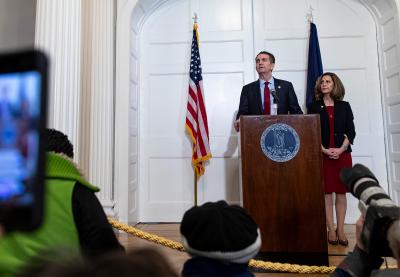For some, the story about Virginia governor Ralph Northam’s medical school yearbook page depicting two young men wearing blackface and KKK robes and the ensuing fallout is all too familiar: a person in a position of power has done something offensive and insensitive in their past and asks for forgiveness only after it comes to light and becomes public.
You can read more about the history of blackface here and how to discuss its use as a costume with students here. However, this situation raises another issue to bring up in the classroom: what we expect of our public servants and why it’s important to hold both our leaders and ourselves accountable.
Describing the role of government in a 2006 speech, Barack Obama stated: “In the end, if the people cannot trust their government to do the job for which it exists—to protect them and to promote their common welfare—all else is lost.” When he took the oath of office to be sworn in as governor, Northam promised to “faithfully and impartially discharge all the duties incumbent upon me as [governor] to the best of my ability.”
Breaking Trust
On Friday, after the blackface photographs from his old yearbook made national news, Ralph Northam apologized for the pain his actions caused. On Saturday, he stated he did not appear in the photos on his yearbook page, but he admitted he had worn blackface at another time. Regardless of whether or not he appeared in the photos, Northam’s response is enough to give citizens, especially African Americans, pause about whether the person who is charged with “faithfully and impartially" representing their best interests can actually be trusted to do so.
When we as citizens elect someone to public office—school board, city council, governor, president—we are asking them to represent us, our interests, our communities in the public sphere. If those you represent do not believe that you can act on their behalf, as an ally with their best interests at heart, then you have broken that public trust.
Raising Expectations
Ask your students why it might be problematic if someone entrusted with representing others does something to violate that trust. What happens if there are no repercussions? Ask students how they expect to be treated by each other. Ask them how they expect you, as their teacher, to conduct yourself. What about their principals? Their student body president? Do they expect favoritism? Do they expect those people to act “impartially” and ensure equal opportunities for everyone they represent?
You can have students think about the connections between how they conduct themselves in their own lives—at school, at home, out in public—and what they will carry with them as they become old enough to vote, hold positions of power or act on behalf of others. You can use these brainstorming sessions to write a social contract for your classroom.
Push students further by asking about the differences between them and someone in power. Should there be variation in how we’re expected to act compared to those in power when it comes to being impartial or treating others with equal respect and dignity? What should the consequences be for breaking the trust of a group or individual with words or actions?
This is not to say that people in power will never make mistakes, or that they cannot apologize for those mistakes. It’s about laying the foundation for a standard we should all aspire to—one in which we, as members of a diverse democracy, should seek to ensure that we are not doing anything which might break the trust of those around us or make others feel unequal. If we expect it of our leaders, we must first expect it of ourselves.
Tobin is a teaching and learning specialist at Teaching Tolerance.
